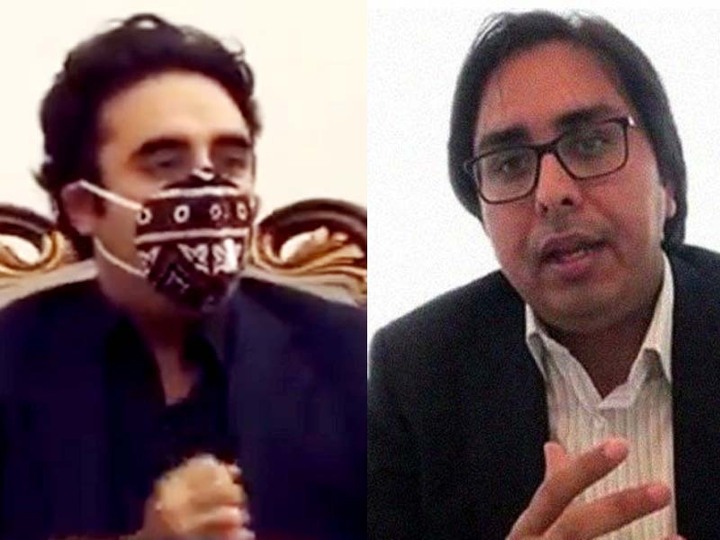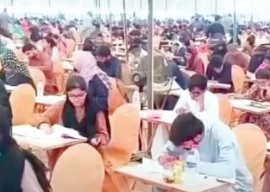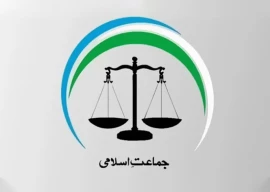
Special assistant to the prime minister on political communication Shahbaz Gill has been facing criticism from different quarters over his comments on Pakistan Peoples Party (PPP) chairperson Bilawal Bhutto Zardari sporting a mask made of ajrak - a fabric that is an integral part of Sindhi culture.
Making an appearance in a television show on Wednesday, Gill commented, "I had heard about playing the provincial card, but this is the first time I have seen [Bilawal] playing the provincial mask." He went on to compare Bilawal to calves in villages having old pieces of cloth tied around their mouths to stop them from drinking too much milk.
This sparked outrage among activists, politicians, journalists and others in Sindh and across the country, as people took to Twitter to condemn Gill's remarks and share pictures of themselves wearing ajrak. They dubbed Gill's words "racist" and a "cultural attack" on the people of Sindh.
"Promote cultural identity, promote national pride. Those who ridicule culture are no less than racists," tweeted PPP MNA Nafisa Shah, along with the hashtag #AjrakisOurPride.
Promote cultural identity, promote national pride. Those who ridicule culture are no less than racists. #AjrakisOurPride pic.twitter.com/WkZDhw06Jg
— Nafisa Shah (@ShahNafisa) July 23, 2020
Similarly, PPP MPA Sharmila Farooqi, taking to Twitter, pointed out that Sindhi nationalist leader GM Syed, while presenting the Pakistan Resolution in the Sindh Assembly in 1943, was representing Muslims, not just Sindhis. "He wasn't only representing Sindhis. This is our history and our culture. Be proud of it," she said in a tweet.
Emphasising the significance of ajrak in Sindhi culture, PPP MPA Qasim Siraj Soomro tweeted, "Ajrak is [the] colour of our skin."
Gm syed while presenting the Pakistan resolution in the Sindh Assembly was representing the voice of the Muslims, he wasn’t only representing sindhi’s. This is our history our culture! Be proud of it! #AjrakIsOurPride pic.twitter.com/SsDHihQrxh
— Sharmila faruqi (@sharmilafaruqi) July 23, 2020
Meanwhile, Sindh government spokesperson Murtaza Wahab, in a statement, said that perhaps Gill was unware of the sub-continent's history. Stating that the Indus Valley's footprints could be found from Ladakh to the Arabian Sea, he added, "Ajrak is not just the identity of Sindh, but also of the Indus Valley. It is the identity of Pakistan."
In the same vein, Sindh Culture, Tourism and Antiquities Minister Syed Sardar Ali Shah remarked, "Tell your [Gill's] Pakistan Tehreek-e-Insaf government to progress rather than criticising Bilawal Bhutto and targeting ajrak."
Activists and journalists, too, voiced rejection of Gill's remarks, posting their photos donning ajrak on social media.
Realising his mistake, perhaps, Gill proceeded posted a photo of him wearing an ajrak shawl himself on Twitter, stating, "Sindhi ajrak is [the] heir of [a] beautiful, centuries-old culture. Sindhi ajrak is [a] major part of Pakistan's art and craft [sector]. Please do not use this beautiful thing for politics."
سندھی اجرک سندھ کہ خوبصورت کلچر اور صدیوں پرانی ثقافت کی وارث ہے۔ سندھی اجرک پاکستان کہ آرٹ اور کرافٹ کا اہم ترین حصہ ہے۔ براہ کرم اس خوبصورت چیز کو اپنی سیاست کے لئے استعمال مت کریں۔
— Dr. Shahbaz GiLL (@SHABAZGIL) July 22, 2020
#AjrakIsOurPride pic.twitter.com/7oofyaFTNh
However, several activists and politicians continued to call for him to offer an apology for his comments.Deep roots
A fabric often seen in shades of red, blue, black and white, the ajrak and its distinctive block print pattern have long been a symbol of Sindhi identity. Yet even before it gained this status, it was associated with the ancient Indus Valley civilisation.
When Moenjodaro was discovered, one of the artifacts found was a terracotta bust of the King Priest, draped in a shawl with a trefoil (three-leaved plant) motif. This pattern has become associated with the ajrak, while even the technique of dyeing and printing the fabric was adopted from the ancient civilisation, according to researchers.
In Sindh, the word is synonymous with pride as people wrap the fabric around their necks, drape it over their shoulders, wrap it into a turban and present it to others as a gesture of goodwill.A sensitive matter
While Gill's comments are not the first to spark outrage about cultural attire, anthropologist Dr Salman Ejaz explained that minority ethnic groups are often sensitive when it comes to their language and cultural identity.
"Pakistan has several different cultural identities. They all should respect each other," he told The Express Tribune, adding, "Gill's comments can be considered a reflection of government policy by many."
Ejaz then referred to recent uproar over the association of naswar, powdered tobacco snuff, with Pashtuns in a television drama. "The government and its representatives must learn how to talk. They should [also] take action against such remarks but unfortunately they [politicians] are creating hatred amongst Pakistan's people," he rued.
Meanwhile, Muhammad Hasham Soomro, an ajrak maker from Tando Muhammad Khan, told The Express Tribune that whenever such incidents occurred, demand for the fabric surged.
However, he lamented, "Ajrak is a symbol of love and brotherhood but unfortunately people use it as a political tool."
With input from Z Ali







1725254039-0/Untitled-design-(24)1725254039-0-270x192.webp)















COMMENTS
Comments are moderated and generally will be posted if they are on-topic and not abusive.
For more information, please see our Comments FAQ